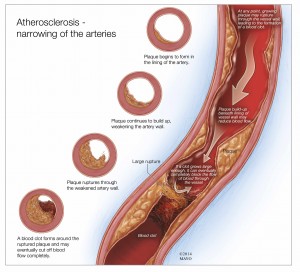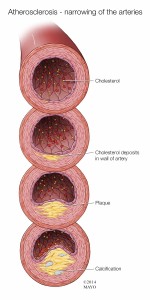-
Cardiovascular
Tuesday Q and A: In some cases, ED may be early warning sign of heart disease
DEAR MAYO CLINIC: I am 58 and asked my doctor for a prescription for erectile dysfunction. He recommended I also have tests done to evaluate my heart. How are ED and heart disease related?
ANSWER: In some cases, erectile dysfunction, or ED, may be an early warning sign of heart disease. It is often a good idea for men diagnosed with ED to have tests to make sure that ED is not a symptom of a heart condition. That is especially true if you have risk factors that increase your chances of developing heart problems. If a heart condition is found, treatment for that disorder also may help reverse ED.
The connection between ED and heart disease involves a condition known as atherosclerosis — sometimes called hardening of the arteries. Atherosclerosis happens when plaques build up in your arteries. When plaques start to accumulate, the smaller arteries in the body, including those in the penis, are the first to get plugged up. The plaque lowers blood flow in the penis, making an erection difficult.
Erectile dysfunction alerts doctors to look for atherosclerosis in larger arteries that supply your heart and other organs and, if found, to take steps to treat atherosclerosis. In addition to heart problems, atherosclerosis also increases your risk of other serious health problems, including aneurysm, stroke and peripheral artery disease.
Certain risk factors make it more likely that your ED is related to heart disease. For example, if you have a family history of heart disease, the risk is higher that ED is linked to heart problems, particularly if you have a parent, sibling or child who developed heart disease at a young age.
 Your age makes a difference, too. The younger you are, the less likely that erectile dysfunction signals a risk of heart disease. But for men older than 40, especially those who have risk factors for atherosclerosis, the importance of ED as a warning of future heart problems increases significantly. In men older than 70, erectile dysfunction is so widespread that it loses its predictive value as a sign of heart disease.
Your age makes a difference, too. The younger you are, the less likely that erectile dysfunction signals a risk of heart disease. But for men older than 40, especially those who have risk factors for atherosclerosis, the importance of ED as a warning of future heart problems increases significantly. In men older than 70, erectile dysfunction is so widespread that it loses its predictive value as a sign of heart disease.
Other chronic medical conditions increase the likelihood of heart disease as the root cause of ED. They include diabetes, high cholesterol, high blood pressure and obesity. Being a smoker raises your risk of atherosclerosis, too. Smoking also has a negative effect on your ability to get an erection, even if you do not have another underlying health problem.
When doctors suspect atherosclerosis, they typically recommend blood and imaging tests. An ultrasound also may be used to check your blood flow, as well as examine your arteries for signs of plaque buildup.
If you do have atherosclerosis, making certain lifestyle changes will help. Research has shown that eating a healthy diet, exercising regularly, maintaining a healthy weight and not smoking are often enough to maintain heart health when atherosclerosis is in its early stages. These changes are likely to improve sexual function, as well.
When a heart problem is more severe or more advanced, you may need to take medication to treat it. If you take heart medications, be aware that certain drugs, especially nitrates, are not safe to take with many of the medications used to treat erectile dysfunction. If that is the case for you, talk to your doctor about other treatment options for ED. Fortunately, in many cases, treatment for heart disease also helps treat ED. — David Simper, M.D., Men’s Health Clinic and Cardiovascular Diseases, Mayo Clinic, Scottsdale, Ariz.







